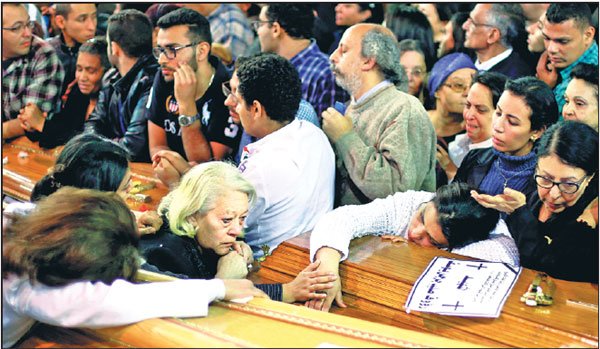Xi extends condolences over attacks
By Xinhua-china Daily (China Daily) Updated: 2017-04-11 07:20|
Relatives of victims react to coffins arriving at the church that was bombed in Tanta, Egypt, on Sunday.Ahmed Gomma / Xinhua |
Church blasts in Egypt motivated by IS decline in Sinai, experts say
President Xi Jinping sent a message of condolences to his Egyptian counterpart, Abdel Fattah al-Sisi, on Monday over the terrorist attacks that targeted two churches.
In his message, Xi extended his profound condolences to the innocent victims and sincere sympathies to Sisi, families of the victims, and the injured.
China opposes terrorism in all forms and strongly condemns the barbarous attacks, he said.
The Chinese people will stand firmly with the Egyptian people and resolutely support Egypt's efforts in safeguarding national security and stability, as well as the fight against terrorism, he added.
According to local media, Sunday's twin bomb attacks in the Egyptian cities of Tanta and Alexandria killed at least 44 people and injured more than 120 others.
The recent terrorist attacks on Egyptian churches are motivated by the decline of Sinai-based affiliates of the Islamic State militant group in the peninsula due to massive security campaigns, said Egyptian security and political experts.
Egypt has been fighting a terrorist wave that killed hundreds of police officers and soldiers since the military removed former president Mohammed Morsi in July 2013 and blacklisted his Muslim Brotherhood group as "a terrorist organization".
Mostly claimed by a Sinai-based group loyal to IS, the terrorist attacks focused on security forces in restive North Sinai in the beginning, but after massive security raids that killed hundreds of militants and arrested a similar number of suspects, they started to target the Coptic minority in the most populous Arab country.
"Targeting Copts proves the failure of terrorists in confronting the security forces in the northern part of Sinai. They focused on Sinai in the beginning but their influence and existence eventually declined," security expert Salah Samak said.
Egypt's military intelligence chief, General Mohamed Farag al-Shahhat, said in February that at least 500 terrorists have been killed since a massive anti-terror campaign started in September 2015.
The military forces in cooperation with the police have recently announced eliminating terrorists at Central Sinai's Mount Halal area, a part of North Sinai province bordering Israel and the Palestinian Gaza Strip.
"Despite the terror blasts, terrorism in Egypt in general and in Sinai in particular is declining, which shows success of the security forces in their anti-terror war, and this is why the terrorist moved to target Copts," said the security expert.
"Those bombers who target churches are marginal members of the terrorist group who have been newly recruited to be easily convinced to kill Christians," he said, stressing that fresh militant recruits could easily be misled to kill innocent civilians of other religions.
Sunday's blasts have been claimed by IS, which also claimed responsibility for a previous church blast in Cairo in December 2016 that left at least 28 worshippers dead, mostly women and children.
Mokhtar Ghobashy, deputy chairman of the Arab Center for Political and Strategic Studies, said that two church bombings on Sunday came in response to the military operations in Sinai.
"Through the two church blasts, the terrorist groups want to prove that they still exist and that they are able to target different places across the country," Ghobashy said.
Constituting to about 10 percent of Egypt's Muslim-majority 94 million people, the Copts are believed by experts to be a new target of terrorist groups as anti-Christian attacks draw world attention to pressure the Egyptian administration.
"Sunday's blasts represent one of the episodes of the conflict between terror groups and the Egyptian state and they are meant to largely pressure the Egyptian administration and weaken the country's national unity," Ghobashy said.
- 'Cooperation is complementary'
- Worldwide manhunt nets 50th fugitive
- China-Japan meet seeks cooperation
- Agency ensuring natural gas supply
- Global manhunt sees China catch its 50th fugitive
- Call for 'Red Boat Spirit' a noble goal, official says
- China 'open to world' of foreign talent
- Free trade studies agreed on as Li meets with Canadian PM Trudeau
- Emojis on austerity rules from top anti-graft authority go viral
- Xi: All aboard internet express












